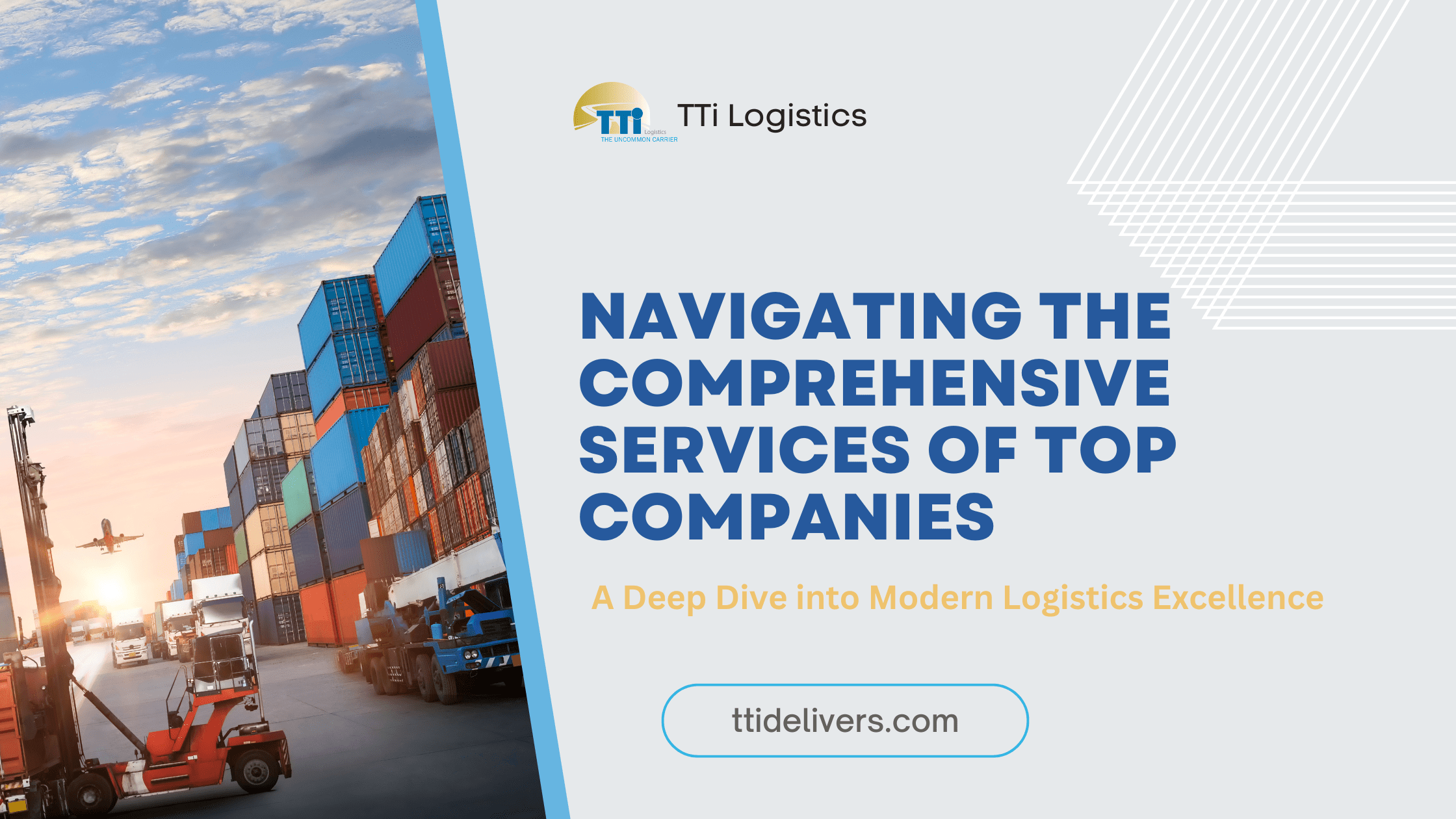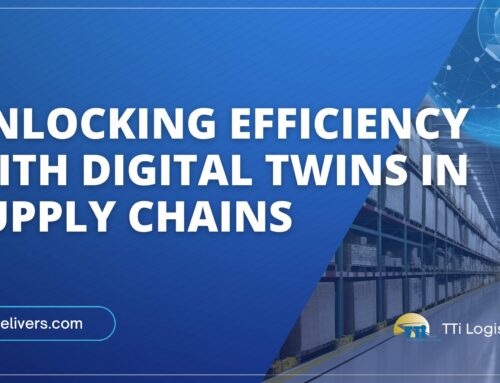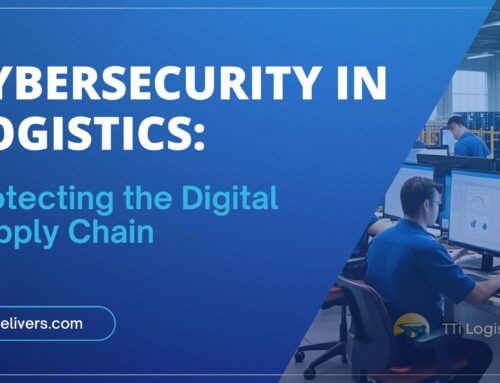A New Era in Logistics: How Industry Leaders Are Transforming Supply Chains
In the ever-evolving landscape of the global economy, the intricate web of logistics services provided by top companies is increasingly recognized as a pivotal force in ensuring the efficient movement of goods and services across the intricate supply chain. This exploration aims to delve even deeper into the multifaceted aspects of logistics, shedding light on the comprehensive services offered by industry leaders. As we embark on this journey, navigating through the realms of procurement, production, packaging, transportation, warehousing, and distribution, we will witness how top companies have evolved to offer an all-encompassing Logistics 360 experience, demonstrating their prowess in managing the complexities of modern commerce.
Introduction to Modern Logistics Excellence
In the fast-paced and interconnected global economy, where businesses operate on a 24/7 basis, the role of logistics has transcended mere facilitation and become a key enabler of success. Recognizing this, top companies in the logistics industry have elevated their services to create a Logistics 360 experience, aiming to address the diverse needs of businesses across various industries. This comprehensive approach involves seamlessly integrating various components of the supply chain, ensuring an optimized and reliable process from the inception of a product to its final destination.
Procurement Mastery: Building Robust Supply Networks
The journey of a product begins with procurement, a fundamental and critical aspect where top logistics companies showcase their excellence. While the initial description touched upon the establishment of robust supplier networks and the negotiation of favorable contracts, let’s delve further into the intricate strategies employed.
These companies deploy advanced analytics to identify potential suppliers, evaluating not just their cost-effectiveness but also their reliability, ethical practices, and alignment with the client’s sustainability goals. Supplier relationship management becomes an art form, as logistics leaders engage in ongoing dialogue, fostering collaboration and adaptability in the ever-changing global marketplace.
Moreover, these companies leverage their extensive global reach not just for the sake of breadth but to strategically diversify and mitigate risks in the supply chain. In-depth market intelligence and forecasting techniques enable them to navigate geopolitical challenges, anticipate disruptions, and ensure a steady inflow of resources for manufacturing.
Streamlined Production Processes: Collaborative Efficiency
While the initial overview touched upon the collaborative efforts with manufacturers to implement lean practices and advanced technologies, let’s explore how this collaboration unfolds in practice.
Logistics companies, acting as strategic partners in the production process, go beyond conventional logistics roles. They actively participate in the design phase, leveraging their expertise to ensure that products are not only transportable but also optimized for the entire supply chain journey.
This collaborative efficiency extends to the implementation of emerging technologies. Logistics leaders work hand in hand with manufacturers to integrate Internet of Things (IoT) devices into production lines, enabling real-time monitoring of manufacturing processes. Predictive analytics algorithms are deployed to identify potential bottlenecks or quality issues before they escalate, ensuring a smoother flow from production to distribution.
Furthermore, these companies embrace a continuous improvement mindset. Regular performance reviews, feedback loops, and data-driven insights enable them to fine-tune their strategies, contributing not only to their operational efficiency but also enhancing the overall effectiveness of the supply chain.
Packaging Innovations: Balancing Safety and Sustainability
Packaging, often considered a secondary concern, emerges as a critical element in the logistics chain. Let’s delve deeper into the strategies employed by top logistics companies in innovating packaging solutions that balance safety and sustainability.
These companies invest heavily in research and development, collaborating with materials scientists and environmental experts to create packaging solutions that not only meet the highest safety standards but also align with the principles of sustainability. Smart packaging technologies, incorporating RFID tags and sensors, are employed not just for tracking but also for monitoring the condition of the products during transit, ensuring their integrity.
In addition to eco-friendly materials, logistics leaders implement circular economy principles in their packaging strategies. Designs that facilitate recycling and repurposing are prioritized, contributing to the reduction of overall environmental impact. The integration of sustainable packaging solutions into their comprehensive service offerings becomes a testament to their commitment to environmental responsibility.
Efficient Transportation Networks: From Tradition to Innovation
The heart of logistics lies in transportation, and top companies pride themselves on having built extensive and efficient transportation networks. While the initial overview touched upon the diversity of transportation options, let’s explore how innovation is seamlessly integrated into traditional methods.
These companies constantly evaluate the evolving landscape of transportation technologies, adopting a proactive stance in embracing innovation. The integration of autonomous vehicles and drones into their fleets is not merely a futuristic vision but a present-day reality. Automated routing systems, powered by artificial intelligence, optimize delivery routes in real-time, not only enhancing efficiency but also minimizing the environmental footprint.
Moreover, these companies actively engage in partnerships and collaborations with technology providers and startups. By staying at the forefront of emerging transportation technologies, they ensure that their clients have access to the most advanced and reliable options available in the market.
Warehousing and Distribution Mastery: Beyond Storage
Warehousing, often perceived as a static component in logistics, is, in reality, a dynamic and strategic aspect that goes beyond mere storage. Let’s explore how logistics leaders employ cutting-edge technologies to master warehousing and distribution processes.
Advanced technologies such as robotics and artificial intelligence are not just buzzwords but integral components of the warehousing ecosystem. Logistics companies invest in state-of-the-art warehouses where robotic systems efficiently manage inventory, drastically reducing the margin for human error and optimizing the space for maximum storage capacity.
Furthermore, these companies leverage predictive analytics to anticipate demand patterns, strategically positioning inventory to minimize transit times and meet the dynamic needs of the market. Collaborative robots, working in tandem with human workers, enhance the speed and accuracy of order fulfillment, contributing to the overall mastery of distribution processes.
Technology Integration in Logistics 360: The Digital Revolution
While the initial overview highlighted the seamless integration of technologies such as the Internet of Things (IoT), blockchain, and data analytics, let’s explore the depth of this digital revolution and its profound impact on logistics processes.
The Internet of Things (IoT) becomes more than a network of connected devices; it transforms into an intricate web of real-time data exchange. Sensors embedded in products, vehicles, and warehouse systems continuously communicate, providing unprecedented visibility into the entire supply chain. This visibility extends not only to logistics companies but also to their clients, fostering a transparent and collaborative ecosystem.
Blockchain, often associated with cryptocurrencies, finds a natural application in logistics. The decentralized and immutable nature of blockchain technology enhances the security and transparency of supply chain transactions. Smart contracts, automated through blockchain, streamline processes such as invoicing and payments, reducing delays and minimizing the risk of errors.
Data analytics, a cornerstone of the digital revolution, takes on a predictive role in logistics. Machine learning algorithms analyze historical data to forecast demand patterns, enabling logistics companies to optimize inventory levels, reduce carrying costs, and enhance overall supply chain efficiency.
The seamless integration of these technologies into the Logistics 360 experience not only augments operational efficiency but also lays the foundation for future advancements. Logistics companies actively invest in research and development, staying attuned to emerging technologies that could further enhance the digital ecosystem of the supply chain.
Sustainability Initiatives: Greening the Supply Chain
While the initial overview touched upon sustainability initiatives, let’s delve deeper into how top logistics companies actively contribute to greening the supply chain.
These companies embrace a holistic approach to sustainability, recognizing that environmental responsibility extends beyond individual actions. Eco-friendly packaging materials, while a crucial component, are just one facet of their commitment. They actively seek to reduce their overall carbon footprint by incorporating green transportation options into their operations.
Electric and hybrid vehicles become staples in their fleets, reducing emissions and mitigating the environmental impact of transportation. Collaborations with energy-efficient transportation providers and investments in alternative fuels further underline their commitment to sustainable logistics practices.
Furthermore, logistics leaders actively engage in partnerships with environmentally conscious suppliers. From the sourcing of raw materials to the manufacturing of products, these companies prioritize suppliers who share their commitment to eco-friendly practices. This collaborative approach extends the sphere of sustainability across the entire supply chain, fostering a culture of environmental responsibility.
The Future of Logistics 360: Embracing Technological Advancements
As technology continues to advance and global supply chains become more complex, the future of Logistics 360 looks promising. The integration of artificial intelligence, machine learning, and robotics will further optimize logistics processes.
Blockchain technology will enhance transparency and security in supply chain transactions. Sustainability initiatives will continue to gain prominence, shaping the future of environmentally responsible logistics.
The integration of artificial intelligence (AI) into logistics processes is poised to redefine the industry. AI-powered algorithms will not only enhance predictive analytics but also enable autonomous decision-making in real-time. This can range from dynamically adjusting transportation routes based on unforeseen circumstances to optimizing warehouse operations for maximum efficiency.
Machine learning, a subset of AI, will play a pivotal role in the evolution of logistics. By continuously analyzing vast datasets, machine learning algorithms will uncover patterns and insights that human analysts might overlook. This proactive approach to data analysis will enable logistics companies to identify opportunities for improvement and preemptively address potential challenges.
The rise of robotics in logistics operations is inevitable. Warehouse automation, including the use of robotic arms for picking and packing, will become more prevalent. Autonomous vehicles, from delivery drones to self-driving trucks, will revolutionize transportation networks. These innovations not only enhance efficiency but also contribute to a safer and more sustainable logistics ecosystem.
Blockchain technology, known for its secure and transparent nature, will continue to reshape how logistics transactions are conducted. Smart contracts, self-executing contracts with the terms of the agreement directly written into code, will automate and streamline various processes, from order placement to payment. The decentralized nature of blockchain ensures a tamper-proof and auditable record of every transaction, fostering trust and accountability in the supply chain.
Sustainability initiatives will not only persist but intensify. Logistics companies will increasingly adopt eco-friendly practices not just for regulatory compliance but as a core value driving their operations. Electric and hydrogen-powered vehicles will become more mainstream, reducing emissions and contributing to cleaner air. The sourcing of materials and production processes will align more closely with environmentally responsible practices, creating a ripple effect across the entire supply chain.
Conclusion: A Holistic Approach to Logistics Excellence
In conclusion, Logistics 360 is a comprehensive and integrated approach that addresses the multifaceted aspects of the supply chain. Top logistics companies, through their expertise in procurement, production, packaging, transportation, warehousing, and distribution, offer end-to-end solutions for businesses seeking efficiency and reliability. As we navigate through the evolving landscape of technology and a commitment to sustainability, the capabilities of logistics companies will continue to enhance, shaping the future of global commerce.
By understanding the intricacies of procurement, production, packaging, transportation, warehousing, and distribution, businesses can leverage the expertise of top logistics companies to streamline their operations and gain a competitive edge. As we look to the future, the continued evolution of technology and a commitment to sustainability will further enhance the capabilities of logistics companies, shaping the landscape of global commerce. The integration of artificial intelligence, machine learning, and robotics will redefine logistics processes, while blockchain technology ensures transparency and security. Sustainability initiatives will not only be a key differentiator but a fundamental aspect of responsible and forward-thinking logistics practices.
In navigating the comprehensive services of top companies, businesses can forge partnerships that go beyond transactional relationships. They can align themselves with logistics providers who share their values, understand their unique challenges, and actively contribute to the success of their supply chain. The journey of modern logistics excellence is dynamic, and as businesses navigate this complex terrain, the guidance of top logistics companies becomes an invaluable asset in achieving sustainable growth and resilience in an ever-changing global market.







